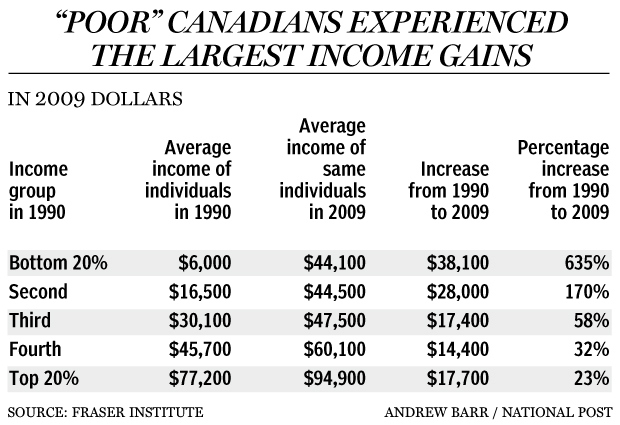Just as a BA failed in Britain used to be the equivalent of a BA with honours in India, being poor in Canada is the equivalent of extravagant wealth in the Sudan.
As it happens, though, even the “poor” in Canada are much better off than they were 20 years ago.

Read more about it here.
If this this continues, the Anglican Church will lose its one of its main raison d’etres: advocating on behalf of the poor. All it will have left is global warming. And that is on thin ice.


Those numbers mean very little unless you factor in what a dollar could buy in 1990 vs now. Transportation, for example, is much more expensive. The cost of gas affects the cost of bus tickets too.
Hello Kate,
I seriously doubt that the rate of inflation of the 19 years 1990 to 2009 has been anywhere close to 635%.
Correct Kate.
Unless you factor in the cost of living the numbers quoted in the article are meaningless.
It’s like saying because a bungalow cost $16,000 in 1968, every poor person can afford to buy one today.
Also, consider the source. The Fraser Institute is just as biased as the Canadian Centre for Policy Alternatives. Stats can lie. I t would be interesting to see exactly how those numbers were arrived at.
Something else just occurred to me – if those numbers are accurate and the gap between the richest and tje poorest is getting smaller, that’s a good thing.
The figures are in 2009 dollars.
This reflects a standard pattern. People start at the bottom and work their way up. In other words, the poor will always be with us, but they will not always be the same people. For instance, I started my working life at 80 cents an hour, but I didn’t stay there. This chart is a demonstration of this pattern. Probabilities are that a young person making minimum wage now will not be in a few years.
Yes, there will always be the poor, and we as Christians (note: not the government) are called to care for them. But if I may be permitted to editorialize on one of my favourite hobby horses, much of current “poverty” is a result of the decline of morality in our society and the resultant increase in single parenthood.
We as Christians have been doing a lousy job of it. I am thankful for our social safety net. I needed it a fewtimes and I am glad it was there.
Hi Kate,
Yes, we need our social safety net, and thank God it’s there. I just shake my head at the thought that some people think the government should do everything, and even some churches’ first thought seems to be to lobby goverments rather than get down to business themselves.
Off-topic I know, but I think of two major hurricanes in the US. I’m not sure if FEMA was all that effective after Sandy, but we see the most effective help probably came from the Red Cross. Many private companies and individuals raised relief money. I heard that after Hurricane Katrina, Walmart and the Home Depot volunteered their trucks to get relief supplies to the affected areas and were turned down by the government. Well, who would know more about transporting large amounts of freight to specific destinations that those two companies, and people are still complaining about the slow recovery from that hurricane.
Government does not have to be our first and only hope for help.
John K,
You make a good pointy about charity. Ideally I would love it if charity were able to fill all the social safety net holes, but it doesn’t.
Most people, including Christians, are incredibily stingy with their cash. Average charitable giving in Canada is a lousy $250/year. Most Anglicans, ANiC included, balk at the idea of proprotionate giving let alone tithing. Parishioners lament constant discussions about money and stewardship. Most believe that everything they have is theirs to do with as they choose.
BTW. if were not for taxation, most rich people would give nothing. Proportionately the poorer you are the more you give (source 1997 Study on Volunteerism and Giving, Canadian Centre for Philanthropy)
And yet there are some very generous people of means. Some of them are very generous to Alpha Ministries. They know they have been blessed for a reason, and give joyfully. When I lived in Edson, a member of the Baptist church I attended owned a successful construction company and pretty much funded the regional Christian school himself. I wish all Christians could know the blessing of tithing. As our own Rector once said, you’ll find the 90% will go further than the 100%. It is true.